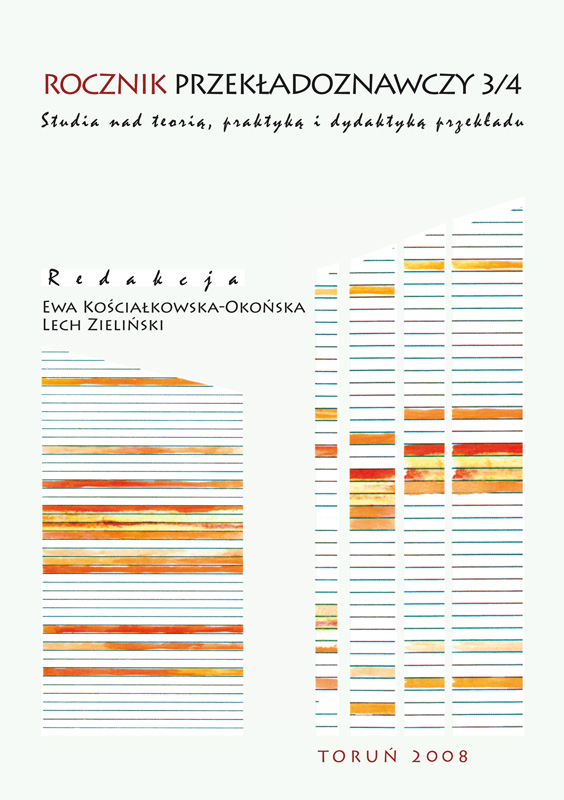Legal construction versus legal translation
DOI:
https://doi.org/10.12775/RP.2008.005Keywords
legal translation, interpretation, translation methodsAbstract
The authors discuss the problems connected with the construction of legal texts done by translators and lawyers. First, the methods of the construction of statutory instruments used by Polish lawyers are discussed and compared with translation strategies. Both lawyers and translators must apply intralingual translation for different purposes. Lawyers do it in order to apply the law in practice, and translators do it in order to perform interlingual translation. Next, the following legal interpretation methods are touched upon: (i) linguistic construction, (ii) system construction, (iii) functional construction, (vi) comparative construction, (v) literal construction, (vi) expansion and (vii) restriction. They are compared with respective translation methods: (i) linguistic analysis, (ii) context-based analysis, (iii) Kierzkowska’s legal translation strategy based on the skopos theory of Vermeer, (iv) comparison of parallel texts, (v) literal or word-for-word translation, (vi) explicitation, and finally (vii) implicitation. Moreover, the authors point out that the unnecessary application of some of those translation strategies and methods may lead to the undesirable side effects such as information loss, information addition, mistranslation, etc. Furthermore, the methods of providing equivalence based on the construction of legal texts for the purpose of interlingual translation are given to stress the differences between intralingual and interlingual translation.
References
Baker, M., 2006, Tranlation and Confl ict. A Narrative Account, London–New York.
Bańczerowski, J., Pogonowski, J., Zgółka, T., 1982, Wstęp do językoznawstwa, Poznań.
Delisle, J. (et al., ed.), 1999, Translation Terminology, Amsterdam–Philadephia. Grzegorczykowa, R., 2001, Wprowadzenie do semantyki językoznawczej, Warszawa.
Jędrzejko, E., 1987, Semantyka i składnia polskich czasowników deontycznych, Wrocław.
Jędrzejko, E., 1988, „O tzw. wewnętrznej i zewnętrznej konieczności i jej podstawowych wykładnikach leksykalnych”, Polonica 13, s. 17–27.
Joseph, J. E., 1995, „Indeterminancy, Translation and the Law”, [w:] Translation and the Law, Morris, M. (red.), Amsterdam–Philadelphia, s. 13–36.
Kaczmarek, K., Matulewska, A., Wiatrowski, P., 2007, „Translacyjne aspekty wyrażania nakazu w polskich, angielskich i węgierskich aktach normatywnych”, Scripta Neophilologica Posnaniensia, Poznań 2007 (przyjęte do druku).
Kiefer, F., 1999, „Modality”, [w:] Concise Encyclopedia of Grammatical Categories, Brown, K., Miller, J., Asher, R. E. (red.), Amsterdam.
Kielar, B. Z., Miler, J., 1993, „Through the Looking Glass of Translation – the Verb Phrases of the Statutory Clauses in Kodeks Handlowy and Their English Renditions”, International Forum of Legal Translation 1992. Proceedings, Warszawa, s. 41–53.
Kierzkowska, D. (red.), 2005, Kodeks Tłumacza Przysięgłego z komentarzem, Warszawa.
Kierzkowska, D., 2002, Tłumaczenie prawnicze, Warszawa.
Lyons, J., 1989, Semantyka 1–2, Warszawa.
Palmer, F. R., 1999, „Mood and Modality: Basic Principles”, [w:] Concise Encyclopedia of Grammatical Categories, Brown, K., Miller, J., Asher, R. E. (red.), Amsterdam.
Radwański, Z., 2005, Prawo cywilne – część ogólna, Warszawa.
Rytel, D., 1982, Leksykalne środki wyrażania modalności w języku czeskim i polskim, Wrocław.
Sczaniecki, M., 1985, Powszechna historia państwa i prawa, Warszawa.
Stawecki, T., Winczorek, P., 2002, Wstęp do prawoznawstwa, Warszawa. V
Vermeer, Hans J., 2001, „Skopos and Commission in Translational Action”, [w:] The Translation Studies Reader, Venuti, L., Baker, M. (red.), London– –New York, s. 221–232.
Wronkowska, S., Zieliński, M., 1997, Zasady techniki prawodawczej, Warszawa. Wronkowska, S., Zieliński M., 1993, Problemy i zasady redagowania tekstów prawnych, Warszawa.
Wróbel, H., 1991, „O modalności”, Język Polski 3–5, s. 260–270.
Wróblewski, B., 1948, Język prawny i prawniczy, Kraków.
Zieliński, M., 2002, Wykładnia prawa. Zasady. Reguły. Wskazówki, Warszawa.
Downloads
Published
Issue
Section
Stats
Number of views and downloads: 683
Number of citations: 0



